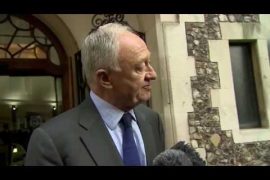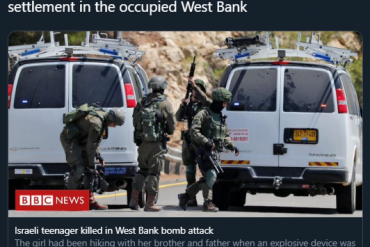An April 20th Guardian report on Britain’s National Union of Students (NUS) election was titled ‘NUS elects first female black Muslim president after tense contest’. However, the report by Jessica Elgot fails to inform readers that the new NUS president, BDS activist Malia Bouattia, represents another first – the first time NUS (a group representing the interests of 7 million British students) will be led by someone who’s supported terrorism and used thinly veiled antisemitic tropes.
Elgot’s report deals with the controversy surrounding Bouattia’s refusal to boycott ISIS for fear of stoking Islamophobia, as well as criticism surrounding her ‘accusation’ that University of Birmingham is “a Zionist outpost in British higher education” due it’s “large Jewish Society”. However, Elgot failed to note far worse comments by Bouattia revealed in a video circulated elsewhere in the media (including at the BBC) hours before her Guardian report was published.
Here’s the video, from an event organized by the Tricontinental Anti-imperialist Platform in September 2014, where Bouattia was speaking in her role as NUS black students officer.
[youtube https://www.youtube.com/watch?v=XyniSax85HQ]
These excerpts represent the most disturbing comments from the video:
“The notion of resistance has been perhaps washed out of our understanding of how colonised people will obtain their physical emancipation…With mainstream, Zionist-led media outlets …resistance is presented as an act of terrorism.“But instead of us remembering that this has always been the case throughout struggles against white supremacy, it’s become an accepted discourse among too many…
“Internalised Islamophobia has also enabled our obsession with convincing non-Muslims of our non-violent and peaceful nature, so we’re taking things a step further and dangerously condemning the resistance, branding groups and individuals as terrorists to disassociate from them, but at the same time supporting their liberation which is a very strange contradiction.
“There’s a need to change how we think about these things. After all, the alternative to resistance is what we’ve been observing over the last 20 years or so, which is ‘peace talks’… essentially the strengthening of the colonial project.
“To consider that Palestine will be free only by means of fundraising, non-violent protest and the Boycott, Divestment and Sanctions movement is problematic… My issue is that whilst at time it’s tactically used, or presented as the non-violent option, it can be misunderstood as the alternative to resistance by the Palestinian people…
“We also need to remember the Palestinians on the ground… who are actively sustaining the fight and the resistance against occupation and perhaps there’s a need to …take orders if we are to really show some form of solidarity”.
As you can see:
- Bouitta expresses sympathy for Palestinian terrorism.
- Bouitta is critical of those would support only non-violent solutions to the Israeli-Palestinian Conflict.
- Bouitta seems to characterize Zionism as one of many “white supremacist” colonial movements throughout history.
- Bouitta condemns the “Zionist-led media”.
Regarding this latter point, it shouldn’t need reminding that the word “Zionist” in this context is almost always a euphemism for “Jewish”.
So, was the Guardian reporter somehow unaware of the video revealing Bouattia’s extremist beliefs? Or, was she aware of it but simply decided not to use it? Either way, the omission certainly denied Guardian readers the opportunity to fully understand why so many Jews, and other truly anti-racist students present at the NUS election, opposed Bouattia and the extreme, regressive left ideology that her candidacy represented.




